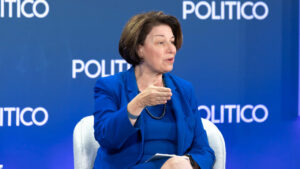Congress
Republican pushes Patel for faster release of Epstein files
Louisiana Republican Sen. John Kennedy pressed FBI Director Kash Patel on Tuesday to continue the release of files in the Jeffrey Epstein case, specifically information about who other than Epstein, if anyone, was on the receiving end of girls and women being sex trafficked.
“The issue’s not gonna go away,” said Kennedy during the Senate Judiciary Committee’s FBI oversight hearing, where Patel was testifying. “I think you’re gonna have to do more to satisfy the American people’s understandable curiosity in that regard.”
Kennedy’s comments were notable as the Trump administration battles complaints about the Justice Department’s slow, piecemeal approach to turning over materials related to the late, convicted sex offender — including from fellow Republicans.
Patel said he agreed with Kennedy’s assessment — a stark contrast with President Donald Trump’s repeated comments that the obsession with the Epstein case was nothing more than a “hoax.”
“I am not saying that others were not trafficked and others were not involved,” Patel said. “The information we are releasing now is historic and it is also to the maximum capacity that the law allows.”
Patel during his testimony has repeatedly pinned blame on Alex Acosta, Trump’s first-term Labor secretary, as a reason for the government’s blind spots on Epstein.
Acosta, who oversaw the Justice Department’s early 2000s prosecution of Epstein, struck a plea deal with Epstein that included a non-prosecution agreement for other potential crimes. That deal, Patel said repeatedly, amounted to a “get-out-of-jail-free” card that limited the federal government’s ability to pursue certain investigative threads.
Patel also said the absence of evidence that Epstein trafficked minors to other people may be a function of those limitations. And he suggested the FBI’s decision not to release some records to the public may also be tied up because of that earlier arrangement.
Congress
House GOP moves to combine central bank digital currency ban with crypto bill
House Republicans are gearing up to retroactively combine GOP legislation that would ban the Federal Reserve from creating a central bank digital currency with a sweeping bipartisan cryptocurrency market structure bill after both bills passed the chamber separately in July.
The House is set to vote Tuesday afternoon on a procedural measure that includes a little-noticed provision that would combine the CBDC ban bill with the CLARITY Act, which would overhaul how crypto tokens are regulated. The CBDC measure, led by House Majority Whip Tom Emmer (R-Minn.), passed the lower chamber largely along party lines in July, while the sweeping market structure bill drew support from 78 Democrats.
At the time the two measures passed the House, Republicans on the Financial Services and Agriculture committees objected to combining them on the floor. A push from GOP hard-liners to merge the two bills created a protracted standoff on the floor. The committee leaders didn’t want to jeopardize bipartisan support for the CLARITY Act in hopes of sending a message about its viability in the Senate.
To appease the hard-liners, GOP leaders vowed to include a CBDC ban in Congress’ annual must-pass defense policy bill. Though language banning a CBDC was included in the House-passed National Defense Authorization Act, few Democrats support the provision, meaning it is likely to get stripped out of the bill by the Senate. Bipartisan support is needed to pass the NDAA in the upper chamber.
A spokesperson for House Financial Services Chair French Hill said in a statement that “passing both the CLARITY Act and Anti-CBDC bill were key priorities for members of the House.”
“By combining both measures and sending them to the Senate, the House continues to advance both priorities,” said the spokesperson, Brooke Nethercott. “We stand ready to work with [Banking Chair Tim Scott] and Senator [Cynthia] Lummis on a pathway forward to get both provisions signed into law.”
The move may ultimately prove to be symbolic: The Senate is gearing up to advance its own market structure bill that will need buy-in from some Democrats. Instead of taking up the CLARITY Act, the House’s title, senators appear to be gearing up to advance their own, separate version of the bill called the Responsible Financial Innovation Act.
Congress
House to vote on resolution honoring Charlie Kirk
House GOP leaders are teeing up a vote later this week on a measure honoring assassinated conservative activist Charlie Kirk.
The resolution is titled “Honoring the life and legacy of Charles ‘Charlie’ James Kirk” and condemns his killing as a “heinous act of violence” and a “sobering reminder of the growing threat posed by political extremism and hatred in our society.” It says “acts of politically motivated violence are antithetical to the principles of a free republic,” in a sentiment that is likely to find wide bipartisan support.
It also praises Kirk as someone whose “steadfast dedication to the Constitution, civil discourse, and Biblical truth inspired a generation to cherish and defend the blessings of liberty,” something that could generate some Democratic grumbling. The resolution follows a Monday vigil organized by Republican leaders in the Capitol’s Statuary Hall.
The House Rules Committee will meet Tuesday afternoon on the Kirk resolution and the recently unveiled seven-week stopgap funding measure. GOP leaders want to vote on both pieces of legislation by Friday.
Congress
House Republicans roll out 7-week funding patch as shutdown looms
House GOP leaders released text Tuesday afternoon of a stopgap funding bill that would provide tens of millions of dollars in security assistance for lawmakers and other federal officials amid growing concern about political violence.
The 91-page measure would head off a government shutdown on Oct. 1 and keep federal agencies funded through Nov. 21, as well as provide $30 million for lawmaker security and a total of $58 million in security assistance the White House requested for the Supreme Court and executive branch. While GOP leaders plan to call a floor vote later this week, it’s still unclear whether Democrats will vote in support of the bill, with President Donald Trump calling on congressional Republicans to stiff-arm the minority party in government funding negotiations.
Some House conservatives voiced opposition to the funding patch even before GOP leaders unveiled it, including Rep. Thomas Massie of Kentucky, a frequent “no” vote. But House GOP leaders believe they have the votes to push the measure through the House by Friday and jam Senate Democrats, even if no House Democrats vote in support.
“They have chosen not to engage Democrats,” California Rep. Pete Aguilar, the House Democratic Caucus chair, said Tuesday. “So my assumption is that they have the plan, and they have something that has the votes.”
If the House does succeed in passing the spending patch later this week, it will pressure Senate Minority Leader Chuck Schumer to hone his demands ahead of the shutdown deadline, since votes of Democrats are needed in the Senate to clear the 60-vote filibuster threshold.
“Our Republican colleagues can say whatever they want. But it is clear as could be that they want a shutdown,” Schumer said on the Senate floor Tuesday morning. “Their actions show they clearly want to shut things down because they don’t want to negotiate with Democrats.”
Republicans note that Schumer has yet to publicly define policy or funding ultimatums ahead of the shutdown deadline, however, as he and House Minority Leader Hakeem Jeffries stick to broad criticism of Republican cuts to health care.
“House is gonna do what the House is gonna do,” Sen. John Kennedy (R-La.) said about GOP leaders moving ahead with a stopgap funding patch.
“Sen. Schumer continues to just talk in concepts and platitudes. And until he puts something on the table, there’s nothing to do,” he added.
The funding in the bill to heighten security for congressional lawmakers, including when back home in their districts, comes in the wake of the assassination of conservative activist Charlie Kirk. The additional $30 million would boost a longstanding program allowing members of Congress to request security through partnerships between the Capitol Police and state and local law enforcement agencies, which has seen a surge of interest from lawmakers. The funding is available to both the House and Senate.
“What we have seen is a broad uptick over the course of the past year of members utilizing the programs,” House Administration Chair Bryan Steil (R-Wis.) told reporters Tuesday morning.
A separate pilot program allowing members to hire private security is slated to end later this month, Steil said, but added that House leaders “can always look at reappropriating currently available funds” to continue it.
The $58 million in emergency funding for extra Supreme Court and executive branch security comes as the White House cites a surge in threats against justices and other public officials in the aftermath of Kirk’s killing.
Fulfilling another White House request, the bill allows the Trump administration to spend whatever funding is necessarily on the WIC nutrition program that serves low-income pregnant women, infants and children. Without that funding leeway, states wouldn’t be able to provide assistance to everyone who is eligible, the White House warns.
The measure also includes the so-called “D.C. fix” which would allow the capital city’s government to spend its full budget, which is mostly funded through locally raised funds, through September 2026. Congress blocked that authority in mid-March by leaving out routine language in the stopgap passed in the spring, blowing a roughly $1 billion hole in the city budget.
The measure introduced Tuesday does not include any of the health care proposals that have been percolating on Capitol Hill, such as extending enhanced tax credits for health insurance under the Affordable Care Act. Low- and middle-income Americans who rely on the program will start to receive notices about higher premiums in the coming weeks, and health insurers will soon lock in pricing. But GOP leaders want to punt the fight, which is deeply divisive within their ranks, to later in the year.
“We have until the end of December to figure all that out,” Speaker Mike Johnson said Tuesday morning.
Nicholas Wu contributed to this report.
-
Uncategorized10 months ago
Bob Good to step down as Freedom Caucus chair this week
-

 The Josh Fourrier Show10 months ago
The Josh Fourrier Show10 months agoDOOMSDAY: Trump won, now what?
-

 Politics7 months ago
Politics7 months agoFormer ‘Squad’ members launching ‘Bowman and Bush’ YouTube show
-

 Politics10 months ago
Politics10 months agoWhat 7 political experts will be watching at Tuesday’s debate
-

 The Dictatorship7 months ago
The Dictatorship7 months agoPete Hegseth’s tenure at the Pentagon goes from bad to worse
-

 Politics10 months ago
Politics10 months agoHow Republicans could foil Harris’ Supreme Court plans if she’s elected
-

 The Dictatorship7 months ago
The Dictatorship7 months agoLuigi Mangione acknowledges public support in first official statement since arrest
-
Economy10 months ago
Fed moves to protect weakening job market with bold rate cut






